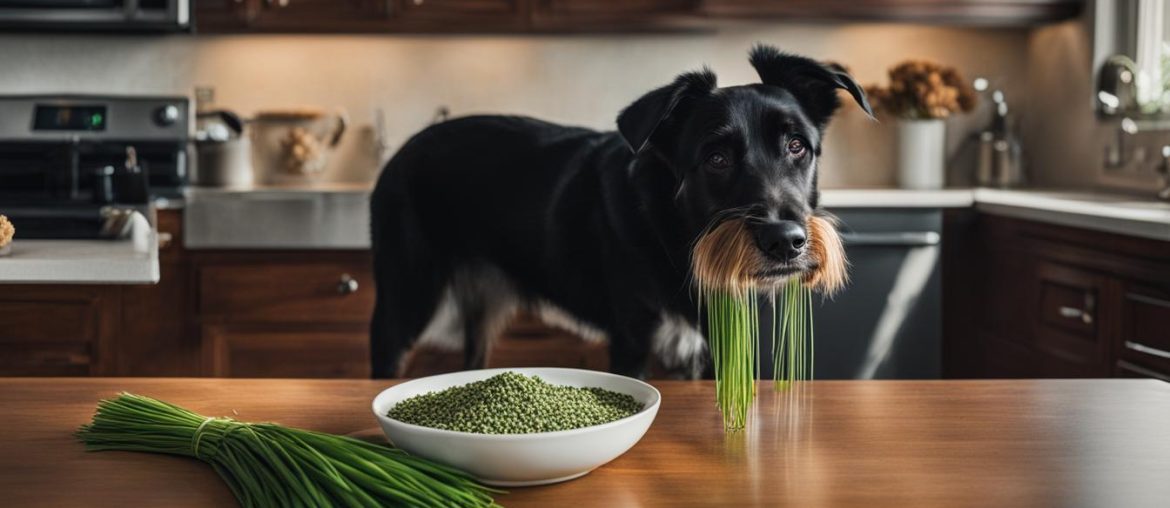When it comes to our furry friends, their health and well-being are of utmost importance. This includes carefully considering what they eat. One common question that arises is whether dogs can eat chives. As an expert in canine health and nutrition, I am here to provide you with guidance on this topic.
Chives, belonging to the Allium family, can pose risks to our canine companions. This family also includes onions, garlic, and leeks, all of which are known to be toxic to dogs. When dogs consume chives, it can cause damage to their red blood cells, leading to anemia. Additionally, chive ingestion may result in gastrointestinal upset, including symptoms such as nausea, drooling, abdominal pain, vomiting, and diarrhea. Other signs of chive poisoning can include lethargy, pale gums, increased heart rate, weakness, exercise intolerance, and even collapse. While small amounts of chives may be relatively safe, it is crucial to avoid large amounts, as they can be highly toxic.
Now that we understand the potential dangers of chives for our canine friends, it is important to explore why these plants are toxic to dogs. Chives contain compounds such as disulfides and thiosulfates, which can be harmful to a dog’s health. These substances have the potential to damage red blood cells and lead to anemia. Additionally, they can cause gastrointestinal upset, resulting in discomfort and other symptoms of toxicity.
Key Takeaways:
- Chives are toxic to dogs and can cause damage to their red blood cells, leading to anemia.
- Ingesting chives may result in gastrointestinal upset, including symptoms such as nausea, drooling, abdominal pain, vomiting, and diarrhea.
- Chives contain compounds that can be harmful to a dog’s health, such as disulfides and thiosulfates.
- It is important to keep chives and other Allium plants away from dogs to prevent potential harm to their health.
- There are safe alternatives to chives, such as parsley, cilantro, and dill, which offer similar flavor and nutritional benefits without the risk of toxicity.
When it comes to ensuring a healthy diet for dogs, it is essential to provide them with balanced and nutritionally complete meals. While chives and other Allium foods should be avoided, there are many safe herbs and seasonings that can be utilized to enhance flavor without compromising a dog’s health. Some examples include parsley, cilantro, and dill, which offer similar benefits to chives but without the toxic effects.
Regular veterinary care is crucial in maintaining a dog’s overall health and well-being. Veterinarians can provide guidance on proper nutrition, including what foods to avoid and what foods are safe for dogs. They can also monitor a dog’s health and detect any potential issues or symptoms of toxicity. Following your veterinarian’s recommendations and seeking immediate veterinary care if you suspect your dog has ingested something harmful is paramount.
To sum up, dogs should not eat chives due to their toxic nature and potential health risks. It is important to be aware of the dangers of chive toxicity and to avoid feeding any Allium foods to dogs. By prioritizing our pet’s health and consulting with a veterinarian for dietary recommendations, we can ensure they receive a safe and nutritious diet.
- Chives are toxic to dogs and can cause damage to their red blood cells, leading to anemia.
- Ingesting chives may result in gastrointestinal upset, including symptoms such as nausea, drooling, abdominal pain, vomiting, and diarrhea.
- Chives contain compounds that can be harmful to a dog’s health, such as disulfides and thiosulfates.
- It is important to keep chives and other Allium plants away from dogs to prevent potential harm to their health.
- There are safe alternatives to chives, such as parsley, cilantro, and dill, which offer similar flavor and nutritional benefits without the risk of toxicity.
Why Chives are Toxic to Dogs
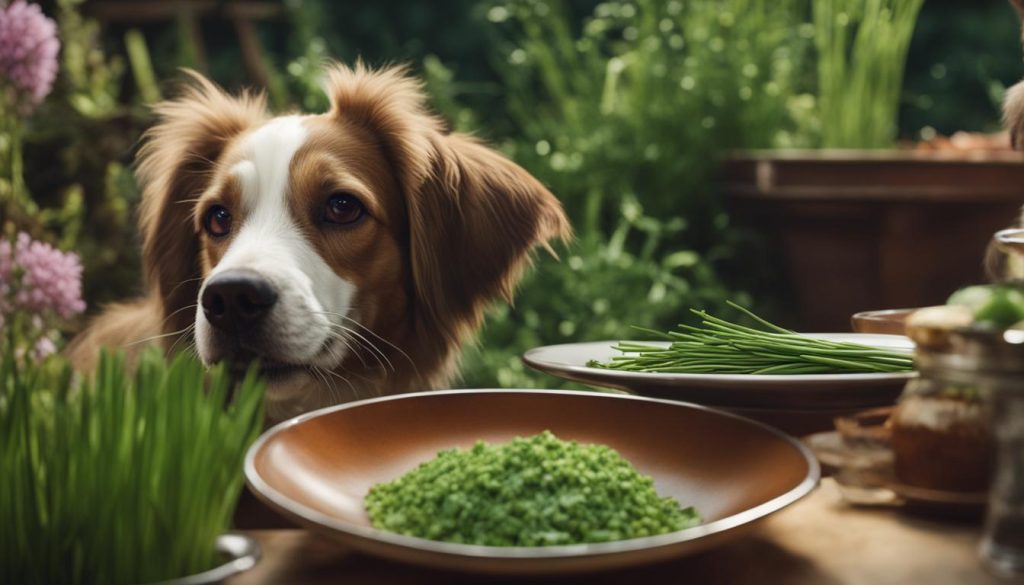
Dogs should not consume chives due to their toxic nature. Chives belong to the Allium family, which also includes onions, garlic, and leeks. These plants contain compounds that can be harmful to a dog’s health. Chives, in particular, contain disulfides, thiosulfates, and other substances that can cause damage to red blood cells, leading to anemia. These compounds can also result in gastrointestinal upset, including symptoms such as nausea, drooling, abdominal pain, vomiting, and diarrhea.
It is essential to keep chives and other Allium plants away from dogs to prevent potential harm. Even small amounts of chives can be toxic, so it’s best to avoid any exposure. If a dog accidentally ingests chives, they may experience various symptoms of chive poisoning, including lethargy, pale gums, increased heart rate, weakness, exercise intolerance, and even collapse. Therefore, it is vital to be aware of the dangers posed by chives and take necessary precautions to protect your dog’s well-being.
The Toxins in Chives
“Chives contain compounds that can damage red blood cells and cause anemia in dogs.”
Chives contain specific compounds that pose a risk to dogs. The disulfides and thiosulfates found in chives can cause oxidative damage to red blood cells, leading to their destruction and subsequent anemia. These compounds can also irritate the gastrointestinal tract, resulting in symptoms such as vomiting and diarrhea. It is important to remember that even small amounts of chives can be toxic, and the severity of the symptoms may depend on the quantity ingested. Therefore, it is always best to err on the side of caution and avoid exposing your dog to chives altogether.
Preventing Chive Toxicity in Dogs
- Avoid feeding your dog any form of chives, including fresh chives, dried chives, chive powder, and any dishes containing chives.
- Check ingredient labels carefully when purchasing dog food or treats to ensure they do not contain chives or any other Allium plants.
- Keep chives and other Allium plants securely stored out of reach of your dog.
- Ensure that family members and visitors are aware of the dangers of chives and refrain from offering them to your dog.
- If you suspect that your dog has ingested chives or is showing symptoms of chive poisoning, contact your veterinarian immediately for guidance and potential treatment.
Safe Alternatives for Flavor:
| Herb | Benefits | Usage |
|---|---|---|
| Parsley | Rich in vitamins A, C, and K; freshens breath | Chop and sprinkle on food or use as a garnish |
| Cilantro | Rich in antioxidants; aids digestion | Chop and sprinkle on food or use as a garnish |
| Dill | Contains essential oils and minerals; aids digestion | Chop and sprinkle on food or use as a garnish |
While dogs should avoid chives, there are safe alternatives that can be used to add flavor and nutritional benefits to their diet. Herbs such as parsley, cilantro, and dill offer similar health benefits as chives without the risk of toxicity. These herbs can be chopped and sprinkled on food or used as a garnish, providing vitamins and minerals without compromising a dog’s health. However, it is always recommended to consult with a veterinarian for specific dietary recommendations for your dog.
Signs of Chive Poisoning in Dogs
When a dog ingests chives, it can lead to various signs of poisoning. It’s important for pet owners to be aware of these symptoms and take immediate action if chive poisoning is suspected. Some common signs of chive poisoning in dogs include:
- Drooling
- Nausea
- Oral irritation
- Vomiting
- Diarrhea
- Lethargy
- Abdominal pain
- Elevated heart rate and respiratory rate
- Weakness
- Exercise intolerance
- Collapse
- Pale gums
If any of these symptoms are observed, it’s crucial to seek immediate veterinary care. Prompt treatment can help prevent further complications and ensure the safety and well-being of the dog.
Chives contain compounds that can be toxic to dogs and cause damage to their red blood cells, leading to anemia. It’s important to keep chives and other Allium plants away from dogs to prevent potential harm to their health. If chive poisoning is suspected, it’s essential to consult a veterinarian for proper diagnosis and treatment.
Remember, prevention is key when it comes to pet safety. Always keep potentially harmful foods out of reach, and be sure to educate yourself about the dangers of certain foods for dogs. By providing a safe and healthy environment for your pet, you can help ensure their long-term well-being.
Safe Alternatives to Chives for Dogs
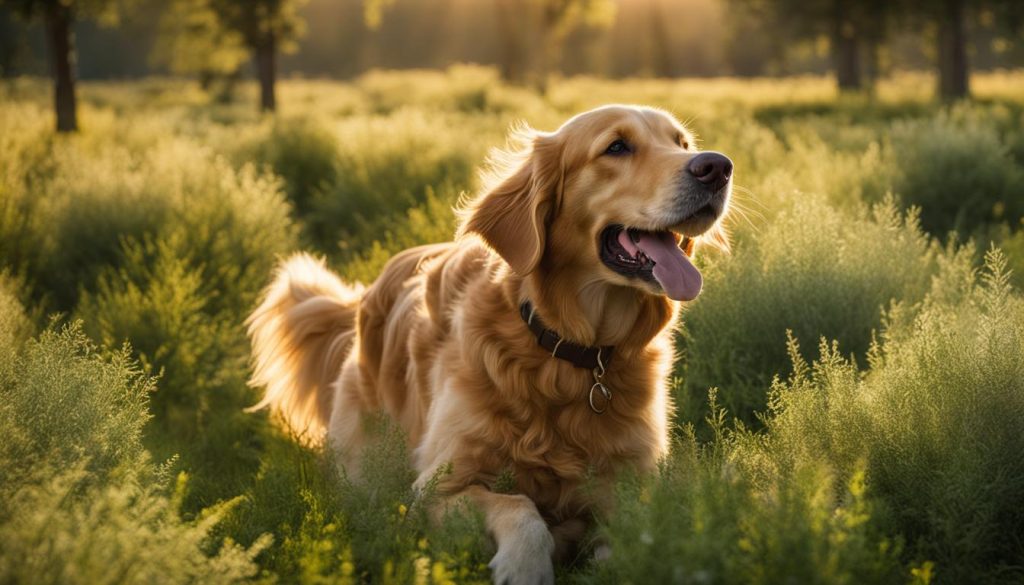
While dogs should avoid chives, there are many safe alternatives that can be used to add flavor and nutritional benefits to their diet. Some dog-friendly herbs include parsley, cilantro, and dill, which offer similar health benefits as chives but without the risk of toxicity. These herbs can be used as toppings for food and can provide vitamins and minerals without compromising a dog’s health.
Parsley is a popular herb that can freshen your dog’s breath and aid in digestion. It is rich in vitamins A, C, and K, as well as iron and calcium. Adding a sprinkle of parsley to your dog’s food can provide a burst of flavor and added nutrients.
Cilantro is another safe herb for dogs. It is known for its detoxifying properties and can help eliminate heavy metals from your dog’s body. Cilantro is also a good source of vitamins A, C, and K, as well as potassium and manganese. Just like parsley, cilantro can be chopped up and added to your dog’s meals.
Dill is a herb that offers a unique and refreshing flavor. It is high in calcium, iron, and vitamin C. Dill can also help soothe upset stomachs and aid in digestion. You can finely chop dill and sprinkle it over your dog’s food to enhance the taste and provide additional nutrients.
| Herb | Benefits |
|---|---|
| Parsley | Freshens breath, aids digestion, rich in vitamins |
| Cilantro | Detoxifying, source of vitamins and minerals |
| Dill | Refreshing flavor, aids digestion, high in calcium and iron |
These herbs can be a safe and nutritious addition to your dog’s diet. However, it’s always important to consult with your veterinarian before introducing any new foods or herbs to your dog’s meals. They can provide personalized guidance based on your dog’s specific needs and health condition.
The Dangers of Allium Foods for Dogs
Allium foods, including chives, can pose significant dangers to dogs. These foods contain compounds that can cause damage to red blood cells, leading to anemia. In addition, allium foods can cause gastrointestinal upset and other symptoms of toxicity. It is crucial for dog owners to be aware of the potential risks and take appropriate measures to keep these foods out of their pet’s reach.
The Toxins in Allium Foods
The toxicity of allium foods stems from the presence of compounds such as disulfides and thiosulfates. These substances can impair the functioning of red blood cells, resulting in a condition known as hemolytic anemia. Symptoms of anemia in dogs can include weakness, lethargy, pale gums, and increased heart rate. If left untreated, anemia can be life-threatening. It is important to note that the toxic effects of allium foods are not limited to chives alone but also encompass other members of the Allium family, such as onions, garlic, and leeks.
Delayed Symptoms and Potential Health Issues
One of the concerning aspects of allium toxicity in dogs is the delayed onset of symptoms. It may take several days for signs of poisoning to appear, making it difficult for pet owners to connect the illness with the consumption of allium foods. Additionally, the ingestion of large quantities of allium foods can lead to more severe health issues beyond anemia and gastrointestinal upset. These can include damage to internal organs, particularly the kidneys, which could have long-term consequences for a dog’s overall health.
| Allium Foods | Symptoms |
|---|---|
| Chives | Nausea, drooling, abdominal pain, vomiting, diarrhea, lethargy, pale gums, increased heart rate, weakness, exercise intolerance, collapse |
| Onions | Gastrointestinal upset, weakness, lethargy, pale gums, increased heart rate, collapse, anemia |
| Garlic | Vomiting, diarrhea, pale gums, increased heart rate, collapse, anemia |
| Leeks | Abdominal pain, vomiting, diarrhea, pale gums, increased heart rate, collapse, anemia |
“The consumption of allium foods can have severe consequences for a dog’s health. It is essential for pet owners to be vigilant and ensure that these foods are never within their dog’s reach.” – Dr. Amanda Stevens, DVM
To protect your dog from the dangers of allium foods, it is important to keep these ingredients out of their diet entirely. Avoid feeding them scraps or leftovers containing onions, garlic, leeks, or chives. It is also crucial to ensure that dogs cannot access allium plants, such as chives, in your garden or yard. By being proactive in preventing allium toxicity, you can safeguard your pet’s health and well-being.
Other Human Foods to Avoid Giving Dogs
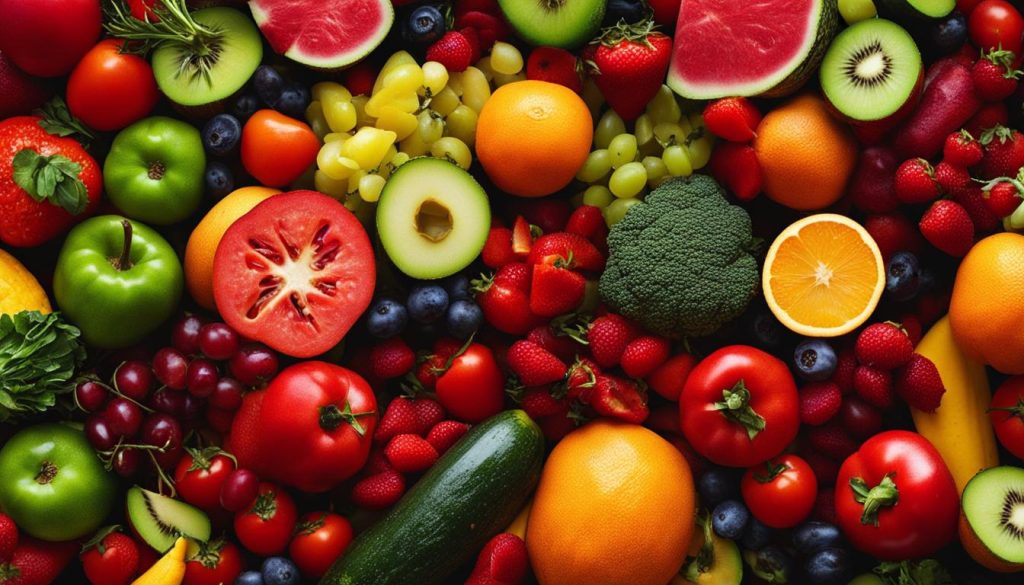
While chives are harmful to dogs, there are several other human foods that should also be avoided. These foods can cause various health issues in dogs and may even be toxic to them. It is important for pet owners to be aware of these foods and to keep them out of reach of their furry friends.
Foods Dogs Should Not Eat
- Chocolate: Chocolate contains theobromine, a compound that can be toxic to dogs. It can cause symptoms such as vomiting, diarrhea, rapid breathing, increased heart rate, seizures, and even death.
- Almonds: Almonds can be a choking hazard for dogs, especially if not properly chewed. They can also cause gastrointestinal distress, such as upset stomach and diarrhea, due to their high fat content.
- Bread: Bread, especially those made with yeast, can cause bloating and potentially dangerous gas buildup in a dog’s stomach. It can lead to discomfort, stomach pain, and in severe cases, a condition called gastric dilatation-volvulus (GDV).
- Garlic and Onions: Garlic and onions contain compounds that can damage a dog’s red blood cells and cause anemia. These ingredients are commonly found in many human dishes, so it’s important to be cautious when sharing food with your dog.
By avoiding these foods and being cautious with what you feed your dog, you can help ensure their health and well-being. If you suspect that your dog has ingested any toxic foods or is experiencing symptoms of poisoning, it is crucial to seek immediate veterinary care. Remember, prevention is key when it comes to keeping your furry companion safe and healthy.
| Food | Potential Health Risks |
|---|---|
| Chocolate | Toxicity, vomiting, diarrhea, increased heart rate, seizures |
| Almonds | Choking hazard, upset stomach, diarrhea |
| Bread | Bloating, gas buildup, stomach pain |
| Garlic and Onions | Anemia, damage to red blood cells |
Tips for a Healthy Diet for Dogs
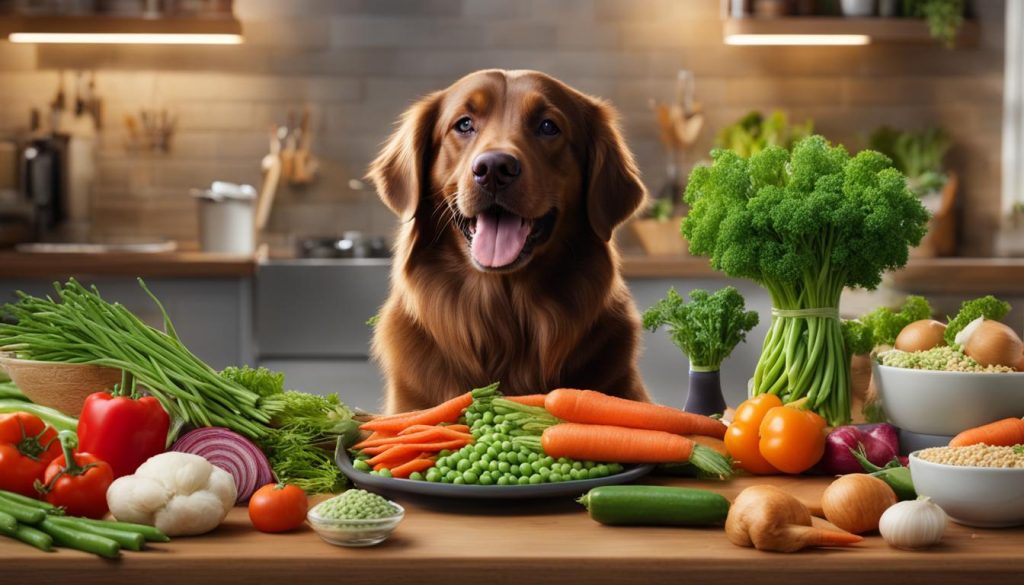
When it comes to ensuring a healthy diet for dogs, there are several key considerations to keep in mind. The right nutrition is essential for their overall well-being and longevity. Here are some tips to help you provide a balanced and nutritious diet for your furry friend:
1. Choose High-Quality Dog Food
The foundation of a healthy diet for dogs is high-quality dog food. Look for brands that provide a complete and balanced nutritional profile. These foods are formulated to meet the specific needs of dogs, ensuring they receive the right balance of proteins, carbohydrates, fats, vitamins, and minerals.
2. Incorporate Lean Meats
Lean meats, such as chicken, turkey, or lean beef, can be a great source of protein for dogs. Protein is essential for muscle development and repair. Be sure to cook the meats thoroughly and remove any bones or excess fat before serving.
3. Include Dog-Friendly Seasonings
Adding flavor to your dog’s meals can encourage them to eat and enjoy their food. Opt for dog-friendly seasonings, such as parsley, cilantro, or dill. These herbs not only enhance the taste but also offer nutritional benefits without compromising your dog’s health.
| Dog-Friendly Herbs | Nutritional Benefits |
|---|---|
| Parsley | Rich in antioxidants and vitamin C |
| Cilantro | Contains vitamins A, C, and K |
| Dill | Provides calcium, iron, and dietary fiber |
Incorporating these herbs can not only enhance the taste of your dog’s meals but also provide additional vitamins and minerals to support their overall health.
4. Consult with a Veterinarian
Every dog is unique, and their dietary needs may vary. It’s always a good idea to consult with a veterinarian to ensure you are providing the right diet for your specific dog. They can provide personalized recommendations based on your dog’s age, breed, size, and any specific health concerns.
By following these tips, you can ensure that your dog receives a healthy and well-balanced diet that promotes their overall well-being. Remember, a healthy diet plays a vital role in keeping them happy and thriving!
The Importance of Veterinary Care for Dogs
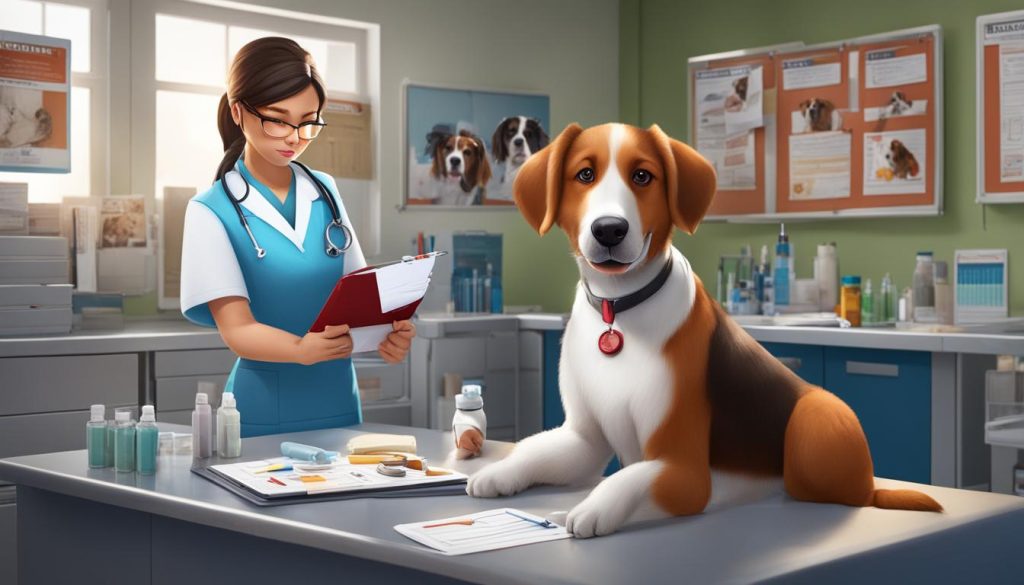
When it comes to ensuring the overall health and well-being of your beloved furry companion, regular veterinary care plays a vital role. Just like humans, dogs require professional guidance and medical attention to maintain optimal health. Veterinarians are highly trained experts who can provide essential advice on dog nutrition, including what foods to avoid, such as chives. They can also offer recommendations for a well-balanced diet that meets your dog’s specific needs.
One of the key benefits of regular veterinary care is the ability to monitor your dog’s health. Veterinarians can conduct thorough physical examinations, detect any potential health issues, and provide early intervention when necessary. They are equipped with the knowledge and expertise to identify symptoms of chive toxicity and other potential dangers. By seeking veterinary care, you can ensure prompt diagnosis and appropriate treatment for your dog.
Additionally, veterinarians can guide you on the best preventive measures to keep your dog safe and healthy. They can provide vaccinations, recommend appropriate medications for flea and tick prevention, and advise on dental care and hygiene. By following their recommendations and maintaining regular check-ups, you can prevent many common health problems and ensure your dog’s well-being for years to come.
| Benefits of Veterinary Care for Dogs: |
|---|
| Regular monitoring of your dog’s health |
| Early detection and intervention for potential health issues |
| Expert guidance on dog nutrition and safe food choices |
| Preventive measures to keep your dog safe and healthy |
Remember, your veterinarian is not only a healthcare provider for your dog but also a trusted partner in their well-being. By prioritizing regular veterinary care and following their recommendations, you can ensure that your dog receives the best possible care, nutrition, and preventive measures.
Wrapping Up
In summary, it is crucial to prioritize the nutrition and well-being of our dogs. Chives, belonging to the Allium family, can be highly toxic to dogs, leading to severe health issues. Their consumption can result in damage to red blood cells, anemia, gastrointestinal upset, and other symptoms of toxicity. Therefore, it is vital to keep chives and other Allium foods away from our furry companions.
Fortunately, there are safe alternatives available to enhance the flavor and nutritional benefits in a dog’s diet. Dog-friendly herbs like parsley, cilantro, and dill can be used as substitutes for chives. These herbs provide similar health benefits without posing any risk of toxicity. Adding them to your dog’s meals can offer essential vitamins and minerals while ensuring their safety.
Remember, maintaining a healthy diet for dogs is key to their overall well-being. Consult with a veterinarian for personalized dietary recommendations that meet your dog’s specific needs. Regular veterinary care is essential as it provides guidance on proper nutrition and helps detect any potential issues or symptoms of toxicity. By prioritizing the health of our beloved pets, we can ensure their long and happy lives.
FAQ
Can dogs eat chives?
No, dogs should not eat chives as they are toxic and can cause various health issues.
Are chives harmful to dogs?
Yes, chives are harmful to dogs. They contain compounds that can damage red blood cells, lead to anemia, and cause gastrointestinal upset.
What are the symptoms of chive poisoning in dogs?
Symptoms of chive poisoning in dogs can include drooling, nausea, vomiting, diarrhea, lethargy, abdominal pain, elevated heart rate, weakness, exercise intolerance, collapse, and pale gums.
What are safe alternatives to chives for dogs?
Safe alternatives to chives for dogs include parsley, cilantro, and dill. These herbs offer similar health benefits but without the risk of toxicity.
Why are allium foods dangerous for dogs?
Allium foods, including chives, contain compounds that can cause damage to red blood cells, leading to anemia. They can also cause gastrointestinal upset and other symptoms of toxicity in dogs.
Are there other human foods that dogs should avoid?
Yes, there are several other human foods that dogs should avoid, including chocolate, almonds, bread, garlic, and onions. These foods can cause various health issues in dogs.
How can I ensure a healthy diet for my dog?
To ensure a healthy diet for your dog, provide them with balanced and nutritionally complete meals, high-quality dog food, lean meats, fruits, and vegetables that are safe for dogs. Use safe herbs and seasonings like parsley, cilantro, and dill for added flavor.
Why is veterinary care important for dogs?
Veterinary care is essential for a dog’s overall health and well-being. Veterinarians can provide guidance on proper nutrition, detect any potential health issues, and ensure your dog receives the best care possible.
Can I feed my dog chives in small amounts?
While tiny amounts of chives may be safe for dogs, it is not recommended to feed them chives at all. Large amounts can be very toxic and harmful to their health.


